I got a Facebook message from an old junior high friend the other day. He’d been out to the Sabine River in the sticky thicket of East Texas, and visited the spot we’d all camped as kids, “Stand by Me” style.
It was a tricky proposition to reach the little haven on the banks of the muddy, gar-and-gator-filled river. The smartest way, of course, was to walk the elevated train route from Highway 259 into the woods and climb down one of the rebar maintenance ladders built into the concrete support pilings. This way, if a train happened to come along, it was fairly easy to get out its way—we’d just toss our sleeping bags over the side and climb down.
The fastest way, though, was to enter the river bottoms just before the tracks crossed the river over an elevated bridge. It took half the time, but there was always a chance that a train hauling freight would come barreling down the tracks—from either direction—and we’d have to hustle across or step onto one of just a couple of little support platforms on the bridge that hung precariously over the river and huddle against the rickety beams as the train whipped past just a few feet away. Only once did we have to sprint along the tracks to stay in front of a train, and, much like that scene in Stephen King’s novella-turned feature film, we had to make leaps from the bridge down to the riverbank. I turned my ankle pretty good and my little brother jettisoned his sleeping bag into the river. Otherwise, everybody was fine.
Once down off the train tracks, we’d wander into the woods along the bottoms, armed with machetes, fishing gear, an arsenal of air rifles, tents, sleeping bags and enough food to get through a few days out in the wild. We’d light a fire, swing from the massive wrist-thick vines that hung from the sweet gum trees into the river and generally go native for a few days. My buddy Pete tells me that one of the swings we’d built to launch ourselves into the river is still there.
When my mom showed up at the appointed time to pick us up a couple of days later, we were bug-bitten, filthy, exhausted and … ready to do it again the next weekend.
I guess it never really occurred to us that, by squatting along the river and venturing into the steamy forest along the water, we were trespassing. Texas, as former presidential candidate and current U.S. Sen. Ted Cruz is fond of saying, has precious little public land—2 percent, to be exact (“And that’s 2 percent too much,” Cruz famously said during primary season, earning eye rolls from anglers and hunters and, sadly, votes from the dogmatic right here in the rural West).
I’m glad my old friend is still wandering along the bottoms now and then, and it’s gratifying to know that some rope-and-wood contraption is still standing over the river, a monument to junior-high hijinks and a silent protest to the Ted Cruzes of the world, who would prefer to see the rest of the country become just like Texas—privately owned, pocked with posted signs and inaccessible to all but the slyest of kids willing to thumb their noses at “the man” and wander along railroad tracks until we reached our own little slice of borrowed paradise. I’m glad to know that you can go home again, and thanks, Pete, for reminding me of those simple times when the biggest worry in the world was making sure somebody brought toilet paper.
Pete’s note was on my mind a couple weeks back, when I visited a familiar stretch of river in the mountains of Colorado, not far from the high-country town of Leadville. As burgeoning anglers, my brothers and I fished the upper Arkansas under the tutelage of two amazing grandfathers—both were accomplished anglers, and both loved the top-of-the-world meadow streams at the base of Colorado’s highest peaks.
Almost every summer, we’d leave the hot, muggy woods of East Texas and go “home” to Colorado for a while, and it was a near certainty that our grandfathers would pile us into an old motorhome and haul us into the high country for what, in retrospect, turned into a fairly high-maintenance endeavor for two aging men. It was a labor of love and almost dutiful—they were determined to share their love of the outdoors, and for fishing, with their grandkids. We were simply the unknowing beneficiaries of two men who, like many do today, took our public lands for granted and simply used them for the bounty they offered. There was never any assumption that, standing on the steps of the little home on wheels overlooking the river, that anyone would ever consider that this place, and thousands of places like it, could be ripped out of shared national ownership and liquidated to the highest bidder. It was unthinkable.
After topping Fremont Pass the other day and taking in the mountain-moving that goes along with long-term molybdenum mining at Climax, I dropped down in the highest reaches of the Arkansas Valley, and pulled off into the same wide spot in the road my grandfathers used decades ago. I can remember the tin cans with the retractable lids that fit right on our belts—it was easy for small fingers to slide the cans open and yank out a reluctant nightcrawler for the size 12 snelled Eagle Claw hooks we used for “tippet” and terminal gear back in the day. I remember the smell of fresh coffee on the old motorhome gas stove. I remember the hearty satisfaction of two old men laughing and playing gin rummy around a couple of beer cans and a white-gas lantern as their grandkids drifted off to sleep.
I strung up a glass 2-weight and wandered across the willow-lined meadow, remembering that this was the place my grandfather Hunt stepped into a beaver hole and tweaked his knee. He told me, years later, that the fishing injury spurred knee-replacement surgery and was the beginning of the end of his mobility. I remember that this is the place where my Grandfather Muller handed out pocket knives to all of us kids, because he wanted clean fish when we got back to camp. When we got back with clean fish, he’d sternly ask for the knives back. Once, I spent more time hunting for the pocket knife I’d foolishly left on the riverbank after cleaning my limit of trout than I did actually fishing. The idea of disappointing my Grandad was unbearable.
On this day the river was swollen with June runoff. It ripped along its course and proved unproductive, but I wasn’t dissuaded. Just across the little valley, where generations of beavers had constructed ponds and expertly diverted the Arkansas, I knew I’d find willing fish. I plunged into the frigid river, wading up to mid-thigh, and stepped out on other side. A few steps later, I stood at the edge of a beaver pond that was at least as old as me, and the progeny of the brook trout I caught as a kid finned happily and largely unmolested in the flat, clear water.
As a kid, it never occurred to me who owned this river and the willow marsh along its banks. It was never even considered—we never asked permission. We parked the motorhome and went fishing. Today, I know this stretch of the Arkansas is managed by the San Isabel National Forest and it belongs as much to me as it does to Ted Cruz, even if he lacks the foresight to appreciate it. Deep-pocketed political donors ensure that he and a host of other ill-informed lawmakers never truly attempt to acquire such wisdom, unfortunately.
I looked back across the meadow, and I could imagine that old motorhome parked where my rig now rested a mile or so away. I could see two old men wearing tattered work shirts and paint-pocked blue jeans (fishing clothes) expertly assembling rods for three anxious kids, halos of unfiltered tobacco smoke circling their their heads. I could smell the earthy tinge of nightcrawlers plucked the night before from Grandma’s garden, and could feel the anticipation of dropping that first worm into the river and feeling that first tug of the trip.
I cast into the beaver pond and let my fly rest on the water. The ghosts of my grandfathers stood on either side of me.
An eager brookie launched after the fly,
Just like Pete, I went home again.




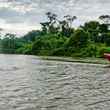


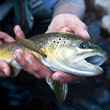
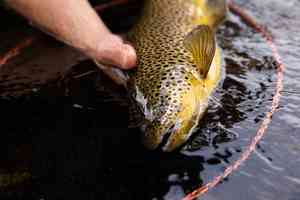

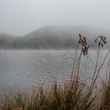
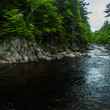

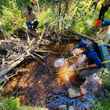
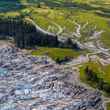
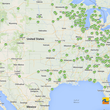








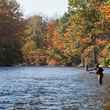
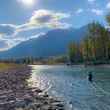
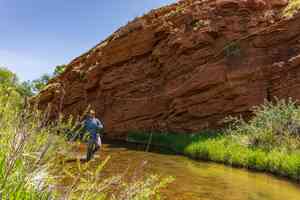

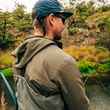

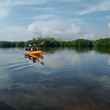
Comments
Greg replied on Permalink
Beautifully written. I'm a first generation angler with no kids, so your story stirs up feelings of nostalgia for a time I never had, nor will have. I have to confess some jealousy! But I sure am glad for the land and water access I am able to enjoy,
Hexmeister replied on Permalink
Beautiful--and spot on. This whole movement to sell off and privatize our public lands is so wrong-headed on every level that whenever I think about it I fear my head's going to explode....
Mike Lindo replied on Permalink
Beautiful story. Loved it.
safetyjack replied on Permalink
Fine writing, even with the bleeding-heart liberal stuff flowing through it,. A lot of conservatives agree with you about the lack of access to public lands or the lack of such.
rockyquong replied on Permalink
Thanks for one's marvelous posting! I really enjoyed reading it, you're a great
author. I will make sure to bookmark your blog and will
eventually come back later in life. I want to encourage you to continue your great
posts, have a nice day!
my web blog; Loan Mortgage
Pages